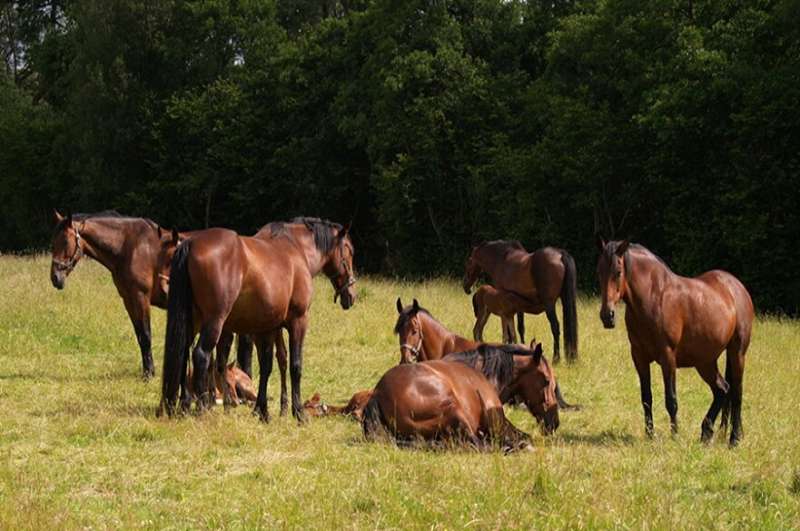Safeguarding genetic diversity of England's oldest established horse breed

The study, involving researchers at Nottingham Trent University, has focused on minimizing relatedness amongst the rare breed by supporting breeders with historical information about individual horses' kinship via their pedigree records.
The team, based in the university's School of Animal, Rural and Environmental Sciences, says this work could be applied to other rare and endangered animal breeds to ensure their genetic status is maintained.
The work, which has taken place over almost 20 years, has helped to reduce the rate of inbreeding in Cleveland Bay horses from more than three percent per generation to less than 0.5% per generation.
In addition, the effective population size in the UK—which takes into account the breeding, unrelated adults in any population—has increased from 20 in 1994 to more than 140 in 2020.
The consequences of poor breed management and inbreeding can lead to a variety of serious health concerns in individual animals, including problems with fertility.
Small populations of animals, as well as larger unmanaged groups, can be plagued by genetic regression often due to a lack of breeding support tools which are easy to use and can support breeders' decision-making.
A Breed Conservation and Management System (BCAS) has been developed which offers breeding recommendations based on horses' genetic backgrounds. It offers breeders a simple red, amber, green system based on whether horses are related and should be bred.
The Cleveland Bay is a heritage British breed that originated three centuries ago in the northeast of England, where it was used both as a carriage horse and to work the land.
Since the end of the first world war the breed has suffered a substantial decline in numbers due to modernized transport and mechanization of agriculture.
By the 1950s it was close to extinction, with only four pure bred stallions remaining and it is currently one of seven equine breeds listed as a priority by the Rare Breeds Survival Trust.
The Cleveland Bay Horse Society published its first studbook in 1885, containing retrospective pedigrees of animals dating back to 1723; this now yields a non-Thoroughbred studbook dating back almost 300 years and covering 38 generations.
The researchers argue that as a result of this work the Cleveland Bay is now in a genetically sustainable position.
They say their population management tool could be applied to any captive species, from rare and endangered breeds, to animals in zoos and livestock.
"What we have created is like a family tree for Cleveland Bay horses," said Nottingham Trent University researcher Professor Philippe Wilson.
He said: "There are serious and growing concerns about genetic diversity in many breeds. Animals are bred for all sorts of commercial purposes and for particular traits and qualities, but once genes are gone they are gone forever.
"If we do not have enough pure-bred individuals, or if one male in a small population is breeding with many females for instance, this can have a deleterious effect on genetic diversity."
Nottingham Trent University researcher Dr. Andy Dell added: "All livestock has to be recorded by law and we have created a tool which uses animals' pedigree records and genetic status to inform breeding strategy. We have shown this tool to work successfully in improving the population genetics of the endangered Cleveland Bay horse and we can apply our system to other endangered breeds."
The work, which involved the university's School of Animal, Rural and Environmental Sciences, the University of Lincoln and the Cleveland Bay Horse Society, is published in the journal Ecology and Evolution.
More information: Andrew Dell et al, 16 Years of breed management brings substantial improvement in population genetics of the endangered Cleveland Bay Horse, Ecology and Evolution (2021). DOI: 10.1002/ece3.8118
Journal information: Ecology and Evolution
Provided by Nottingham Trent University




















